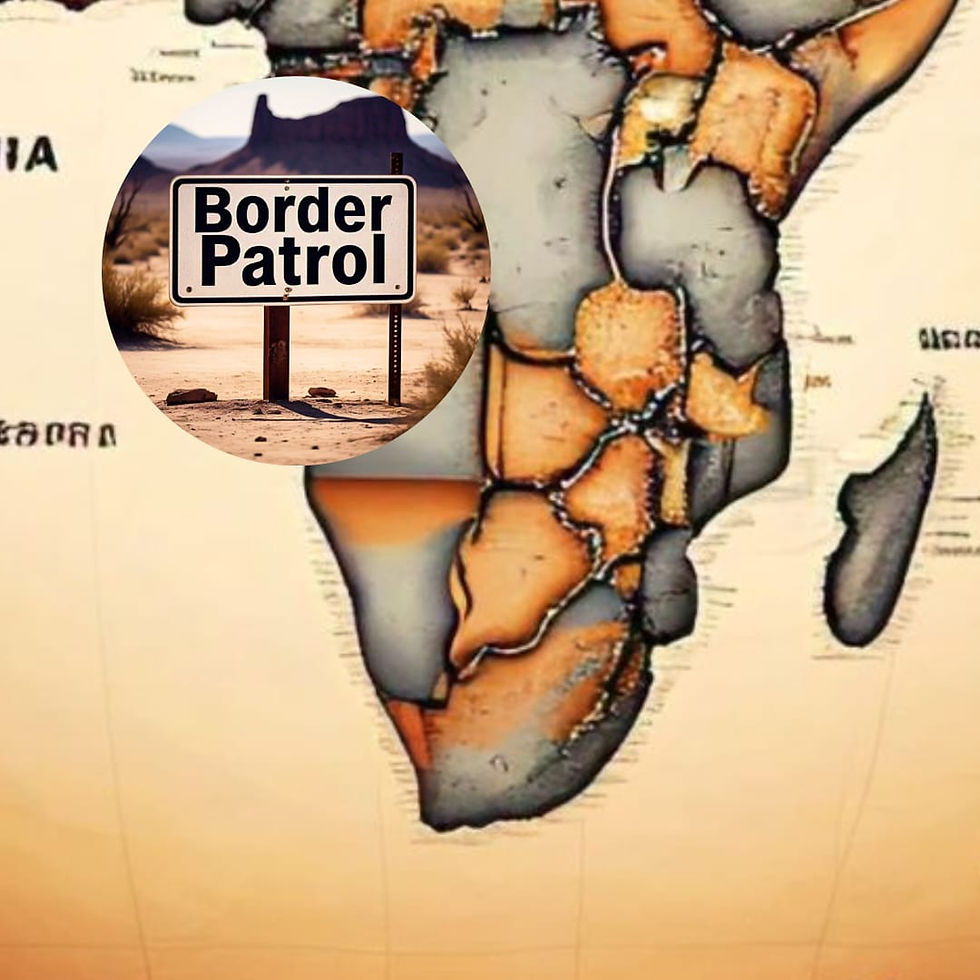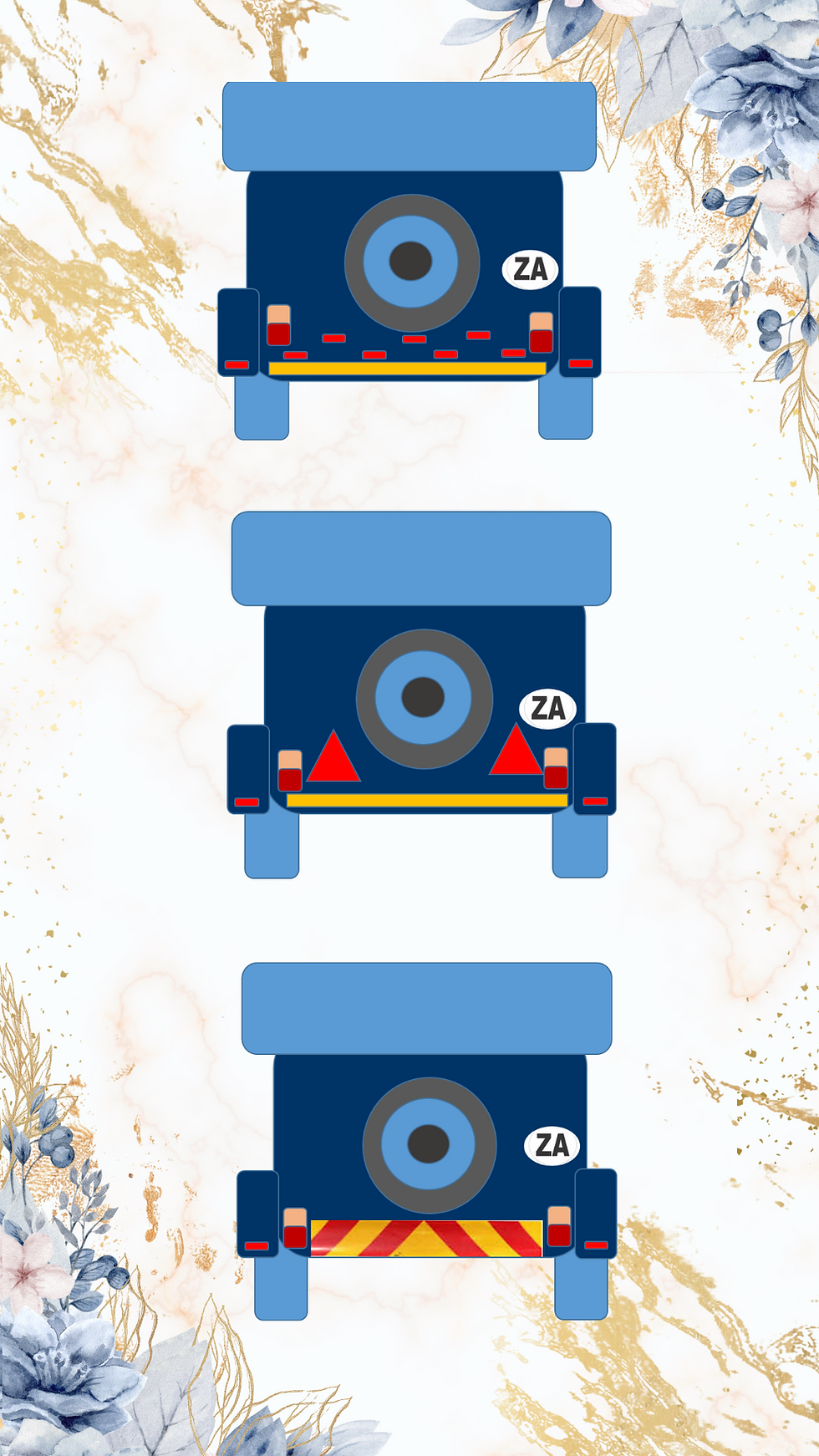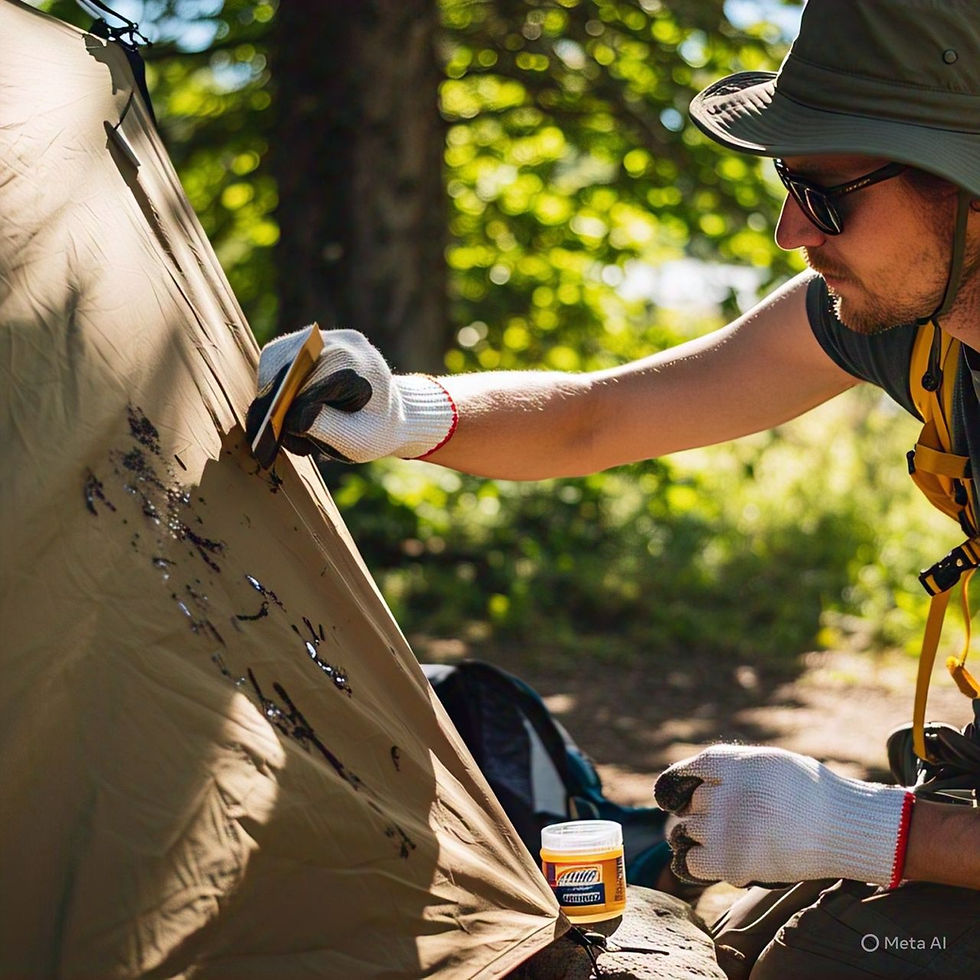Uncovering the Essential Requirements for Safely Crossing African Borders with Your Trailer
- ronel115
- Dec 17, 2024
- 11 min read
Updated: Apr 29
Crossing borders in Africa opens up an exciting world filled with vibrant cultures, stunning landscapes, and unforgettable experiences. However, to enjoy this adventure with your trailer, preparation is key. Ensuring you understand the various regulations, documentation, and inspections required can make your journey smoother. This post will guide you through all the essentials for a safe and enjoyable crossing.

Understanding Border Requirements
Before you embark on your journey, it's important to grasp the specific requirements at each border you will encounter. Every African nation has its own regulations regarding vehicle imports, including trailers. Here are some key points to help you prepare:
Vehicle Registration Documents: Always carry the original and multiple copies of your vehicle and trailer registration documents. For example, if traveling from South Africa to Zambia, it's essential to have your documents organized as Zambian border officials will check for authenticity.
Insurance Validity: Ensure your vehicle insurance is recognized in all countries you will visit. If driving through countries like Botswana and Namibia, obtaining a "green card" insurance is highly recommended. This proof of insurance is accepted in several Southern African nations.
Customs Declaration Forms: Completing customs declaration forms is vital for transparency about your trailer. This process ensures you declare items of significant value, which may be subject to inspection.
Import Permit: Some countries require an import permit for your trailer, particularly if it's larger than 2.5 meters in width or 2.6 meters in height. These regulations can vary greatly, so researching each destination is essential.
Health and Safety Regulations
Traveling with a trailer means you must also adhere to specific health and safety protocols. Failure to comply can lead to delays or denial of entry. Here's what to do:
Check Health Requirements: Many countries require vaccinations such as Yellow Fever. For instance, if you plan to cross into countries like Kenya or Uganda, ensure you have your Yellow Fever vaccination certificate on hand, as officials will ask for it.
Pack a First Aid Kit: A comprehensive first aid kit is a must-have for any trailer trip. This kit should include basic medical supplies, commonly used medications, and your emergency contacts. Keeping this kit stocked ensures you’re ready for minor injuries or health issues on the road.
Vehicle Inspection
An often-overlooked part of cross-border travel is ensuring your trailer is in good condition before you leave. Conduct a thorough inspection to avoid complications. Here's what to consider:
Braking Systems: Verify that your brakes are operational and meet the regulations of the countries you are entering.
Tires: Assess your tire condition; they should not be worn, and it's best to have at least 1.6mm of tread depth for safe travels.
Lights and Indicators: Ensure all lights, including indicators and hazard lights, function properly to avoid accidents and fines.
Load Security: Check that all items within your trailer are secured. Loose items can be dangerous and lead to road accidents.
Trailer Reflector Requirements

At least 80% of the trailer body should be covered with yellow/amber reflective tape
Rear of Trailer:
Choose one of the following options:
- 2 red triangle reflectors
- 7 rectangular reflectors
- Chevron plate (required for trailers over 3500kg)
Mudguards:
- Front: fit a white reflector
- Rear: fit a red reflector
Customs Clearance Process
Customs clearance can differ significantly by country. Here are some strategies to ease the process:
Arrive Early: Some border crossings can take several hours. For example, at the Beit Bridge border between South Africa and Zimbabwe, it's not uncommon to wait two to three hours during peak travel times.
Organize Documentation: Keep all essential documents in a dedicated folder for easy access. This includes passports, vehicle registration, insurance details, and completed customs forms.

Currency and Payment Methods
Navigating different currencies can be tricky. Understanding payment options can save you a lot of hassle. Consider the following:
Carry Local Currency: Always have sufficient local currency on hand for minor transactions, especially in more remote border areas where card payments may not be accepted.
Understand Exchange Rates: Familiarize yourself with current exchange rates to avoid unfair rates or scams when exchanging money. For instance, exchange rates between South African Rand and Mozambican Metical can fluctuate daily.
Fuel and Maintenance Stations
Fuel availability can be sparse in certain regions of Africa, making it crucial to plan your stops carefully:
Research Fuel Availability: Identify regions along your route where fuel stations are limited. When you see a station, refuel even if your tank isn’t empty; this practice prevents unfortunate surprises.
Regularly Check Maintenance Needs: Be attentive to your trailer's condition. In areas like Northern Namibia, mechanical repair facilities may be few and far between, so proactively addressing maintenance issues is wise.
Communication and Navigation
A smart approach to communication and navigation can enhance your journey.
Local SIM Card: Purchasing a local SIM card ensures you stay connected with family or friends while helping you navigate better.
Offline Maps: Downloading offline maps is crucial, especially when traveling through less populated areas where internet access may be limited.

Cultural Considerations
Engaging with the diverse cultures throughout Africa enriches your travel experience. Here are some tips:
Learn Basic Phrases: Knowing a few local phrases can help establish rapport with locals. For example, saying "asante" (thank you) in Swahili can leave a positive impression.
Be Aware of Local Customs: Familiarizing yourself with local etiquette fosters respectful interactions, which can enhance your experience as you travel from country to country.
The Border Lowdown: Requirements for Each African Country bordering South Africa
Download Border Times Below
Namibia Travel Guide
Reflectors & Lights: Display a ZA sticker on the back of your car and trailer. Make sure to position it on the right-hand side to comply with regulations.
Meat & Food Rules: Bringing meat? Fine for personal use:
Up to 25kg/person & 3 per vehicle (mutton, goat, and beef).
10kg biltong/processed meat allowed.
No pork or chicken.
Meat can be brought into the north above Grootfontein, but it cannot be taken out from there.
Questions? Call Agriculture Ministry: +264 61 276580.
Customs Rules: Duty-free for personal use:
1L liquor, 2L wine, 50ml perfume, 250ml Eau de Toilette.
400 cigarettes, 50 cigars, 250g tobacco.
New/used items under N$2000.
Gifts ≤ N$200? No worries. Anything above pays tariffs.
Documents:
Valid passport
Vehicle registration, and letter of authority (if not the owner or financed by the bank). Include respective ID numbers, stating that you have permission to take the vehicle across the border.
Trailer/Caravan Registration papers
Valid driver’s license
Vaccinations & Precautions:
Yellow Fever is compulsory if from affected areas.
Recommended: Hepatitis A/B, Typhoid, Polio, and Tetanus.
Malaria risk—plan accordingly.
Currency: Namibian Dollar (NAD) and South African Rand are widely accepted.
Most towns accept cards.
Botswana Travel Guide
Reflectors & Lights:
Display a ZA sticker on the back of your car and trailer. Make sure to position it on the right-hand side to comply with regulations (not closer than 15cm to the number plate).
2 x Breakdown triangles, plus another two for any trailer or caravan towed.
Meat & Food Rules: Meat/Dairy: Regulations change frequently due to disease outbreaks. It's advised not to import these products as a tourist. Always check with customs upon arrival.
Remember, no pork whatsoever is allowed across Botswana’s border.
Up to 25kg per family (mutton, goat, and beef).
Poultry 5kgp/person
Eggs 36 per eggs
Milk 2L P/Person
Bread – 6 loaves
Fresh Milk – 2l per person
Questions? Call Ministry of Agriculture in Gaborone Tel +267 395-0500
Customs Rules: Duty-free for personal use:
1L liquor, 2L wine, 50ml perfume, 250ml Eau de Toilette.
200 cigarettes, 20 cigars, 250g tobacco.
Documents:
Valid passport
Vehicle registration, and letter of authority (if not the owner or financed by the bank). Include respective ID numbers, stating that you have permission to take the vehicle across the border.
Trailer/Caravan Registration papers
Valid driver’s license
Vehicle Insurance: Third-party insurance (at P50) is required and is valid for 90 days.
Vaccinations & Precautions:
Yellow Fever is compulsory if from affected areas.
Recommended: Hepatitis A/B, Typhoid, Polio, and Tetanus.
Malaria risk—plan accordingly.
Currency: Botswana Pula (BWP)
Mozambique Travel Guide
Reflectors & Lights:
Display a ZA sticker on the back of your car and trailer. Make sure to position it on the right-hand side to comply with regulations.
Blue and Yellow triangle sticker should be placed on the back right-hand side of the trailer as well as the front right-hand side of the vehicle bumper.
Yellow/Amber Reflector tape should cover 80% of the sides, front and back of the trailer.
Red Reflector tape on the rear of the trailer
White T-sticker on far right-hand side, front of trailer and a Red T-sticker on the extreme right, rear of your trailer.
2 x Breakdown triangles, plus another two for any trailer or caravan towed.
Reflective jacket
Meat & Food Rules: Bringing meat? Fine for personal use:
Meat, food and groceries up to the value of 5000Mt (+- R1500)
Please note you will not be allowed to bring any fresh produce (meat, fruits and vegetables) back into South Africa after your holiday.
Mozambique has declared a Foot & Mouth ban on particular meat products from South Africa. Meat you can bring includes chicken, dairy cheese and processed meats (such as bacon).
Customs Rules: Duty-free for personal use:
1L liquor, 2.25L wine, 50ml perfume, 250ml Eau de Toilette.
Beer is not allowed to be imported to Mozambique
100 cigarettes, 50 cigars, 250g tobacco.
Documents:
Valid passport
Vehicle registration, and letter of authority (if not the owner or financed by the bank). Include respective ID numbers, stating that you have permission to take the vehicle across the border.
Trailer/Caravan Registration papers
Valid driver’s license
· Temporary import permit for vehicle (payable in Meticals)
· Third-party insurance (valid for 30 days) - you can go to one of the insurance agents operating outside the main building
· Immigration fees per person
· Declaration form for vehicle (cost per vehicle)
· International driver's license (recommended)
Vaccinations & Precautions:
Yellow Fever is compulsory if from affected areas.
Recommended: Hepatitis A/B, Typhoid, Polio, and Tetanus.
Malaria risk—plan accordingly.
Currency: Mozambican Metical
Most places here accept credit cards but keep enough Meticals with you for the street markets.
Zimbabwe Travel Guide
Reflectors & Lights:
Display a ZA sticker on the back of your car and trailer. Make sure to position it on the right-hand side to comply with regulations.
White T-sticker on far right-hand side, front of trailer and a Red T-sticker on the extreme right, rear of your trailer.
Car Reflectors: Two white reflectors on front bumper and two red reflectors on the rear. 60mm diameter if circular.- Compulsory
A continuous red reflector strip on rear car bumper for twin cabs and light trailers.
Yellow/Amber reflector tape strip along the side when the car and trailer’s length combines 8meters.
Twin cabs and Pick-ups: The GVM and NMV figures should be displayed on the left-hand side
2 x Breakdown triangles, plus another two for any trailer or caravan towed.
New law affective 2011 for fire extinguisher to be stored inside cab. 1 kg Fire Extinguisher (Mass over 0.75kg) for light vehicles and 1.5kg for heavy vehicles should be stored in the cab of the vehicle
Reflective tape must be the “diamond” or “honeycomb” grade.
Important: Spot Fines and Your Rights
Please note that spot fines are only valid if accompanied by an official receipt, specifically Form Z69(j) - Admission of Guilt.
If you are unable or unwilling to pay the fine on the spot, you have the right to request Form 265. This allows you to pay the fine at any police station within 7 days.
Additionally, you are entitled to request the force number of any police officer you interact with. Please ensure you receive this information for your records.
Meat & Food Rules: Bringing meat? Not so fine
All meat must be declared
No fresh vegetables allowed into Zim
Customs Rules:
Duty-free for personal use:
1L spirits, 2L Lighter alcohol
200 cigarettes, 50 cigars, 200g tobacco.
Goods up to the value of US$200
Prohibited: Henna & Palm tree and any products thereof
Documents:
Valid passport
Vehicle registration, and letter of authority (if not the owner or financed by the bank). Include respective ID numbers, stating that you have permission to take the vehicle across the border.
Trailer/Caravan Registration papers
Valid driver’s license
You will need to complete and pay at the border:
Carbon Tax
Third Party Insurance
Temporary Import Permit
C.V.G (Commercial Vehicle Guarantee) for Hire vehicles
Road Access Fee
Vaccinations & Precautions:
Yellow Fever is compulsory if from affected areas.
Recommended: Hepatitis A/B and Tetanus.
Malaria risk—plan accordingly.
Currency: Zim Dollar
Zambia Travel Guide
Reflectors & Lights:
Display a ZA sticker on the back of your car and trailer. Make sure to position it on the right-hand side to comply with regulations.
2 x Breakdown triangles, plus another two for any trailer or caravan towed.
Car reflectors: Two small white reflective rectangular size strips on the right and left hand side of the front bumper as well as two red reflective strips on the right and left hand side of the rear bumper..
White reflective T sticker on black background displayed on the right front of the trailer and a red reflective T sticker on a black background on the right-hand back of the trailer.
Fire Extinguisher compulsary when carrying jerry cans.
Meat & Food Rules: Bringing meat? Fine for personal use:
There are currently no food restrictions
Customs Rules: Duty-free for personal use:
2.5L Clear beer, 2.5L Wine and 1.5L Spirits.
400 cigarettes, 50 cigars, 500g tobacco.
Important Travel Alert: Plastic Bag Ban in Zambia
In 2019, Zambia implemented a ban on single-use plastic bags to protect the environment. To avoid heavy fines, travelers arriving in Zambia must ensure they do not have any plastic bags in their possession.
This includes:
- Shopping bags
- Garbage bags
- Zip-lock bags for liquids and cosmetics
Documents:
Valid passport
Vehicle registration, and letter of authority (if not the owner or financed by the bank). Include respective ID numbers, stating that you have permission to take the vehicle across the border.
Trailer/Caravan Registration papers
Valid driver’s license
Third party insurance is compulsory at the border post.
Police clearance certificate when arriving from Chirundo. There is currently discussion around potentially waiving the requirement for police clearance certificates when crossing the South African border. However, this policy has not been officially confirmed and remains unclear.
You will need to complete and pay the following at the border:
CIP (Customs Importation Permit for vehicles) Valid for 30 days
Certificate of Motor insurance
Pay District council
Road Transport and Safety Agency
Temporary import permit (TIP) acquired at points of entry
Compulsory third-party insurance
Carbon emissions surcharge (dependant on engine capacity)
Road access fee (valid for one year)
Council levy (paid on entry and exit
Vaccinations & Precautions:
Yellow Fever
Recommended: Typhoid, Tetanus. Rabies and Meningitis
Malaria risk—plan accordingly.
Currency:
Kwacha
Make sure you have Kwacha with you at the border. There are exchange bureaus but you can expect a less-than-ideal exchange rate.
Credit cards are increasingly accepted in Zambia, but only in larger towns and cities.
Eswatini (Swaziland) Travel Guide
Reflectors & Lights: Display a ZA sticker on the back of your car and trailer. Make sure to position it on the right-hand side to comply with regulations.
Meat & Food Rules: Bringing meat? Fine for personal use:
Customs Rules: Duty-free for personal use:
1L liquor, 2L wine, 50ml perfume, 250ml Eau de Toilette.
200 cigarettes, 20 cigars, 250g tobacco.
New/used items under E25000.
Documents:
Valid passport
Vehicle registration, and letter of authority (if not the owner or financed by the bank). Include respective ID numbers, stating that you have permission to take the vehicle across the border.
Trailer/Caravan Registration papers
Valid driver’s license
Third-Party Insurance: Included in the fuel price; no document required
Vaccinations & Precautions:
Yellow Fever is compulsory if from affected areas.
Recommended: Hepatitis A/B, Typhoid, Polio, Tetanus and Rabies
Currency:
Lilangeni Currency (SZL) Rand is acceptable.
Lesotho Travel Guide
Reflectors & Lights:
Display a ZA sticker on the back of your car and trailer. Make sure to position it on the right-hand side to comply with regulations.
2 x Breakdown triangles, plus another two for any trailer or caravan towed.
Meat & Food Rules: Bringing meat? Fine for personal use:
Customs Rules: Duty-free for personal use:
• 400 cigarettes, 50 cigars and 250 grams of tobacco
• 2L wine, 1L alcoholic beverages, 50ml perfume and 250ml toiletries
• Other legal gifts up to LSL 500.
*South African nationals are banned from importing any alcohol into the country
Documents:
Valid passport
Vehicle registration, and letter of authority (if not the owner or financed by the bank). Include respective ID numbers, stating that you have permission to take the vehicle across the border.
Trailer/Caravan Registration papers
Valid driver’s license
Vaccinations & Precautions:
Yellow Fever is compulsory if from affected areas.
Recommended: Hepatitis A/B, Typhoid, Polio, and Tetanus.
Currency:
Lesotho Loti (LSL)
Final Thoughts
Exploring Africa with your trailer is a thrilling adventure, but it demands adequate preparation and awareness of unique requirements. By following the guidance in this post, you'll not only ensure a safer journey but also immerse yourself in the continent's rich diversity.

Remember, every border crossing presents its challenges, but with proper planning, you can confidently navigate any obstacles that come your way. So pack your trailer, prepare your documents, and get ready for the adventure of a lifetime!




Comments